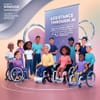Artificial intelligence is transforming the lives of people with disabilities, offering improved autonomy, inclusivity, and the ability to perform daily living activities. AI-driven assistive technologies, adaptive learning tools, and wearable devices are empowering individuals with disabilities to navigate their environments with confidence and independence.
For people who are blind or have low vision, AI-powered tools like OrCam MyEye and smart glasses are revolutionizing daily life. These devices use advanced computer vision to recognize objects, read text from books or labels, and even identify faces, making tasks like grocery shopping, commuting, or social interactions more manageable. Navigation apps powered by AI provide real-time guidance, allowing users to move through unfamiliar spaces with ease.
- Assistive Technologies: AI-driven tools like augmentative and alternative communication systems and adaptive mobility aids are enhancing independence and quality of life.
- Education: AI-powered learning apps tailor content to individual needs, improving learning outcomes for students with disabilities.
- Workplace Inclusion: AI offers autonomy beyond office spaces, enabling people with disabilities to contribute equally to society.
However, realizing the potential of AI requires addressing barriers like algorithmic bias, affordability, and usability issues. Collaborative efforts among researchers, policymakers, developers, and disability advocates are essential to create inclusive, equitable, and effective AI systems.¹ ²
By prioritizing user-centric design and reducing costs, AI can break down barriers and reshape societal perceptions of disability, paving the way for a future where all individuals can thrive.


